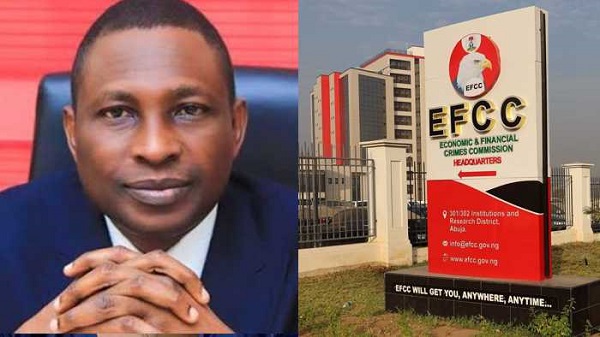The Chairman of the Economic and Financial Crimes Commission (EFCC), Ola Olukoyede, has announced the dismissal of two officials involved in corruption, as part of the ongoing reforms aimed at strengthening the commission.
In a statement delivered on Tuesday at the annual Criminal Law Review Conference, organized by the Rule of Law Development Foundation in Abuja, Olukoyede revealed that the officials were dismissed two weeks ago after being found guilty of misconduct. He made it clear that such actions were part of the EFCC’s comprehensive efforts to eradicate corruption within the organization itself.
Olukoyede, who has been vocal in his fight against corruption, challenged Nigerians to bring forward any evidence of him accepting bribes. “Two weeks ago, I had to dismiss two staff members. You can’t fight corruption and have dirty hands,” Olukoyede remarked. “He who comes to equity must have clean hands. I will not only dismiss corrupt staff but will also prosecute them, as we do with others.”
The EFCC Chairman reiterated his unwavering commitment to transparency and accountability, emphasizing that anyone found guilty of corruption within the commission will be held accountable. He acknowledged the imperfections in any system but promised to take swift action against any overzealous staff members or misconduct.
Drawing from his own experience, Olukoyede shared that while serving as EFCC Secretary, he was subjected to a two-year investigation, which provided him with a deep understanding of the investigation process. His goal as EFCC Chairman, he said, is to stimulate Nigeria’s economy through his mandate, while upholding the rule of law. He also emphasized that integrity goes beyond legalities and must include moral conduct.
Olukoyede welcomed constructive criticism of the EFCC but urged Nigerians to approach it responsibly. “Let us scrutinize our institutions in a responsible manner. If the EFCC is doing something wrong, come to us, and I will explain the reforms we have put in place,” he said, calling for a balanced approach to oversight.
During his address, Olukoyede outlined several key reforms under his leadership, including a thorough review of the EFCC’s arrest and detention policies. He revealed that the EFCC no longer engages in excessive charges and has capped the number of prosecution counts in any case to a maximum of 15. This, he explained, ensures that every case is carefully prepared and well-documented before going to court.
In a bid to improve the quality of prosecutions, Olukoyede also clarified that no case will proceed to court without his personal review, particularly in high-profile cases. “If we are losing a case, it shouldn’t be due to a lack of diligent prosecution,” he affirmed, promising to defend his decisions long after his tenure.
The conference, coordinated by Joseph Daudu, centered on the progress made in crime apprehension, prosecution, adjudication, and post-adjudicatory processes. It also coincided with a landmark Supreme Court ruling, which dismissed a suit filed by 16 states challenging the constitutionality of the EFCC Act. The ruling upheld the position that the EFCC Act does not require ratification by state assemblies, marking a significant legal victory for the commission.
This victory solidifies the EFCC’s authority to continue its work without the hindrance of state-level interference, further boosting the commission’s resolve in its fight against corruption.


